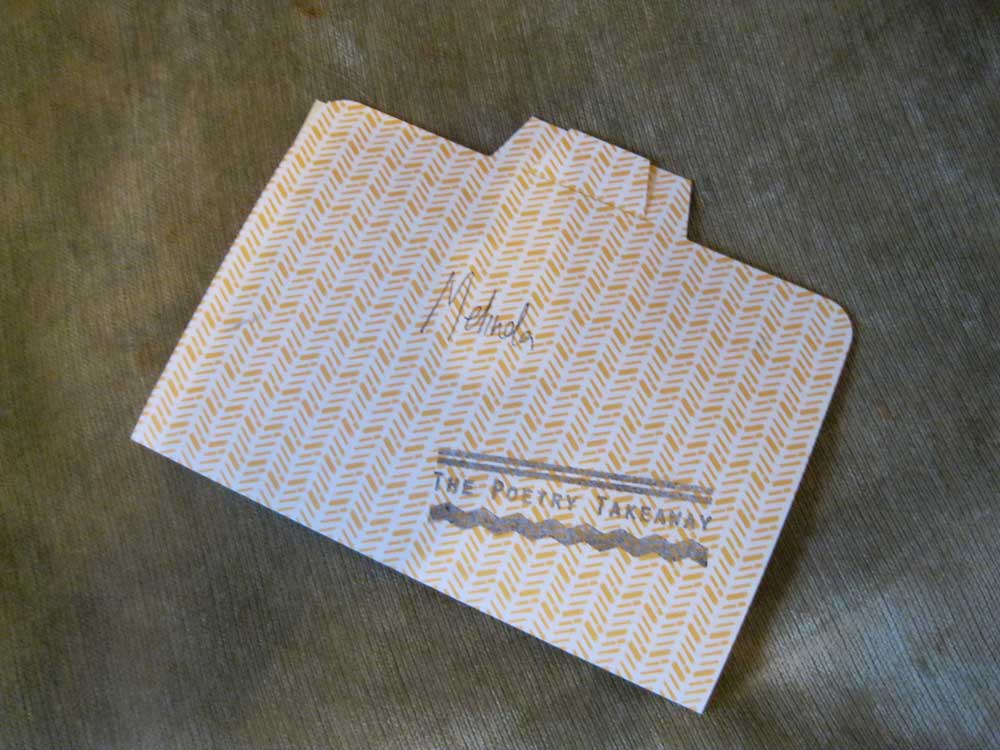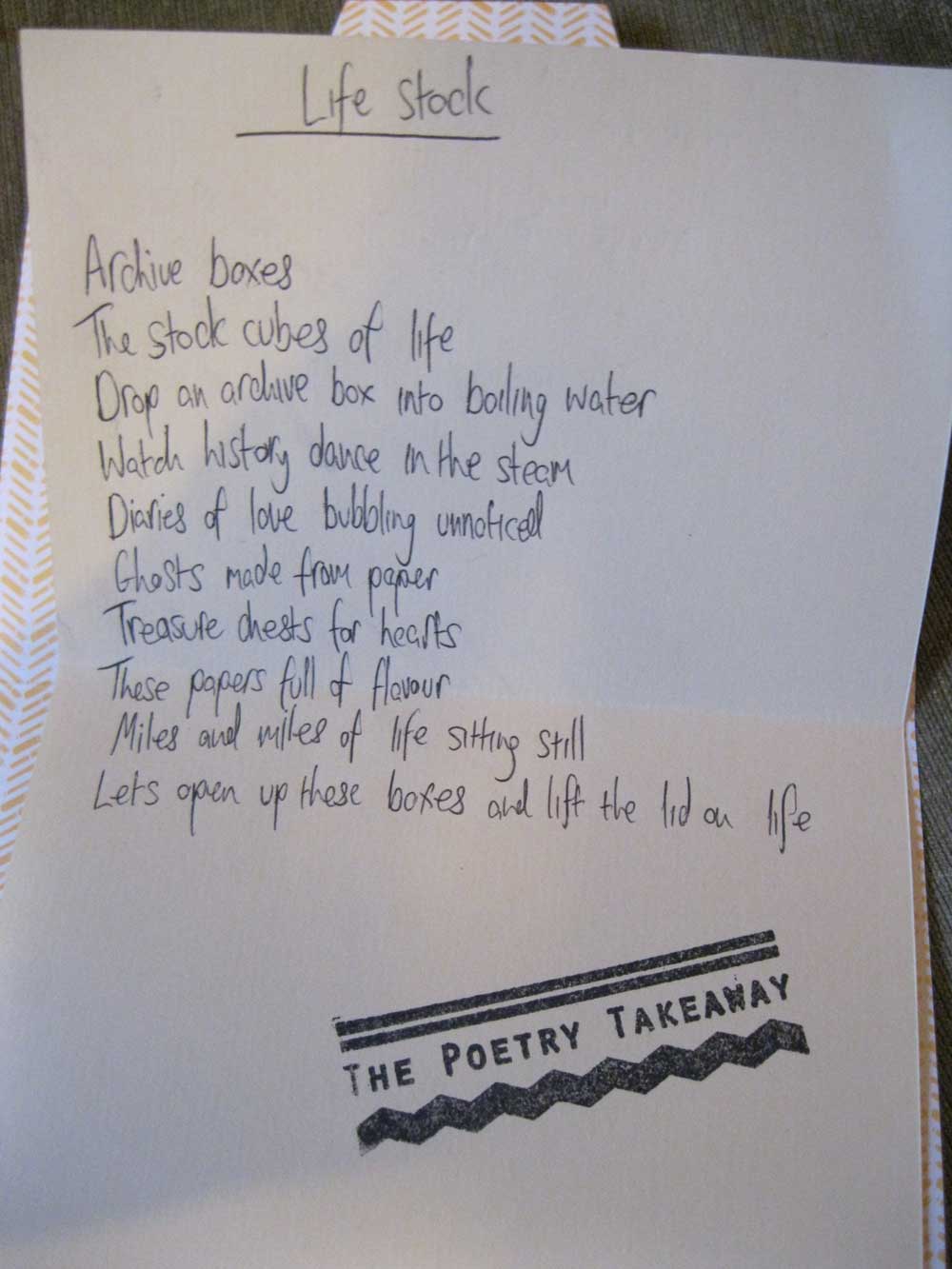I went to a takeaway last weekend. Not your average takeaway. What you take away from this one is poetry. You meet a chef, order your poem, and within a few minutes, voilà – your own tasty (free) takeaway poem from thepoetrytakeaway.com.
I can almost hear some readers of this blog enquiring what, precisely, this has to do with The National Archives. Well, I asked my chef to cook me up a poem about archives. And it’s great.
I think about archives a fair bit, what with working with the wider archives sector, but also being an enthusiast for everything archives can do. A lot of my twitter followers are archivists, which means you’ll find us on Wednesday nights in the season watching Who Do You Think You Are?, eyes peeled for transgressions (“USE A BOOK REST!” flow the tweets. We’re a fun crowd). I’ve been thinking particularly about how we promote the value and use of archives lately. It is partly to do with my work on Archive Service Accreditation – my mission for accreditation is to increase the viability and visibility of UK archive services. Helping people to understand the value of what we hold is a big part of that.

Explore Your Archive badges are starting to appear – in this case as a prize for Accreditation training. Thanks to @stefarchivist for the image!
It is also because we are part of a nationwide awareness campaign for archives – looking forward to seeing many Explore Your Archive celebrations and opportunities in November
We already have Explore Your Archive badges, a twibbon to help you show your support on twitter or Facebook, and some wonderful posters based on four exciting images from archives across the UK, which you will be seeing in November.
But I really want us to celebrate what archives do in words as well as pictures. After all, a lot of our most exciting collections aren’t too photogenic. I’ve been quite inspired by the UCL Museums’ blog feature Underwhelming Fossil Fish of the Month, which does a great job of highlighting lesser known parts of their collections, and drawing out why they do – despite all appearances – still matter. (It’s also very funny, which helps.) I’d love to see archives do the same for some of their less used collections.
But I also want the big picture celebrated: the potential of the hundreds of miles of archives stored across the UK, and what they can mean to us. And so, I explained to my startled poetry chef, I wanted a poem about all those hidden words, all that potential, all that unknown content. I think of archives as just waiting for you or me to open the box and discover what those ghosts of people – writers, diarists, clerks, and past archivists – put into it to keep safe.
I may possibly not have emphasised the ‘keep safe’ bit very strongly in my briefing, since the poem does contain the phrase “drop an archive box into boiling water” (my professional advice: do not drop archive boxes into boiling water). But from the moment I read the title (Life Stock) to the last line (“…open up these boxes and lift the lid on life”), I loved the metaphor my poetry chef used. Imagine our modern researchers and readers as the water, added to the boxed stock cube of archives. When we use archives, we bringing them out of their dry, secure but quite dull storage, and into our world: fresh and nourishing and alive again in a new way.
I’ll be back in November to encourage you to #explorearchives some more. Meanwhile, I hope you’re inspired to poetry by some archives you explore. We’d love to hear from you!



I would add ‘don’t cry over the documents’ (literally) as water can damage them. Why not ask researchers what they have found in November?.
This is very true!
I’d love to hear people’s findings in November, and it’ll definitely be part of the post then. The different paths people take through the archives are always fascinating.
May I mention a related aspect: the research being done on original material prior to accessioning it into ones local archives?
I am in the fortunate position of having in my possession the complete set of Account Books for Skelton Association for the Prosecution of Felons (1787-1973). I have been amazed at just how many different aspects of history this material has shed light on. To name just a few: crime, policing and prosecution (obviously), social status and standing in the community (predictably), the difficulties of travelling any distance (a journey that takes me less than an hour by car took them two days by horse-drawn post-chaise), the drinking habits of the members (oh boy, could they drink! – brandy, rum, gin, whisky, port, ale, tobacco and sugar whenever they broke their journey or stayed overnight). I could go on…
Perhaps what I am really driving at is that, for me, it has been the unexpected, slightly off-topic, discoveries that have turned out to be the most fascinating.
regards,
Peter
Thanks Peter – I completely agree. Sometimes, we know when archives are likely to contain fascinating content, but it’s the unexpected finds and sidelights on events which are often the most memorable part of working with original sources. Hence ‘Explore’ as our favourite word to describe the experience: you never know what you might find!